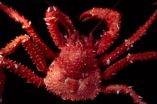(Press-News.org) When looking for new ways to treat aggressive brain cancers, an international team of scientists turned a new leaf and "discovered" the lowly daffodil. A new research study published in the November 2010 print issue of The FASEB Journal (http://www.fasebj.org) offers hope that a natural compound found in daffodil bulbs, called narciclasine, may be a powerful therapeutic against biologically aggressive forms of human brain cancers.
"We are planning to move a narciclasine derivative toward clinical trials in oncology within a three to four year period in order to help patients with brain cancers, including gliomas, as well as brain metastases," said Robert Kiss, Ph.D., co-author of the study from the Laboratory of Toxicology at the Institute of Pharmacy at the Université Libre de Bruxelles in Brussels, Belgium. "We hope narciclasine could be given to brain cancer patients in addition to conventional therapies."
To make this discovery, Kiss and colleagues used computer-assisted techniques to identify targets for narciclasine in cancer cells. The strongest potential candidate to emerge was the eEF1A elongation factor. Researchers then grafted human melanoma brain metastatic cells into the brains of genetically altered mice. Results showed that the injected mice survived significantly longer when treated with narciclasine than those mice left untreated. The researchers believe that narciclasine selectively inhibits the proliferation of very aggressive cancer cells, while avoiding adverse effects on normal cells. Narciclasine could be used in the near future to combat brain cancers, including gliomas, and metastases such as melanoma brain metastases.
"Scientists have been digging in odd corners to find effective treatments for brain cancer for decades, and now they've found one in daffodils." said Gerald Weissmann, M.D., Editor-in-Chief of The FASEB Journal, "It doesn't mean that you should eat daisies or daffodils for what ails you, but that modern medicinal chemistry can pluck new chemicals from stuff that grows in the garden. This is a good one!"
###
Receive monthly highlights from The FASEB Journal by e-mail. Sign up at http://www.faseb.org/fjupdate.aspx. The FASEB Journal (http://www.fasebj.org) is published by the Federation of the American Societies for Experimental Biology (FASEB). The journal has been recognized by the Special Libraries Association as one of the top 100 most influential biomedical journals of the past century and is the most cited biology journal worldwide according to the Institute for Scientific Information.
FASEB comprises 23 societies with more than 100,000 members, making it the largest coalition of biomedical research associations in the United States. FASEB enhances the ability of scientists and engineers to improve—through their research—the health, well-being and productivity of all people. FASEB's mission is to advance health and welfare by promoting progress and education in biological and biomedical sciences through service to our member societies and collaborative advocacy.
Details: Gwendoline Van Goietsenoven, Jenna Hutton, Jean-Paul Becker, Benjamin Lallemand, Francis Robert, Florence Lefranc, Christine Pirker, Guy Vandenbussche, Pierre Van Antwerpen, Antonio Evidente, Walter Berger, Martine Prévost, Jerry Pelletier, Robert Kiss, Terri Goss Kinzy, Alexander Kornienko, and Véronique Mathieu
Targeting of eEF1A with Amaryllidaceae isocarbostyrils as a strategy to combat melanomas
FASEB J. 2010 24: 4575-4584. DOI: 10.1096/fj.10-162263 ; http://www.fasebj.org/cgi/content/abstract/24/11/4575
Scientists turn a new leaf to discover a compound in daffodils that targets brain cancer
New research in the FASEB Journal suggests that narciclagsine, a natural compound found in daffodil bulbs, markedly reduces cancer cell proliferation and migration
2010-11-02
ELSE PRESS RELEASES FROM THIS DATE:
Scientists uncover a genetic switch that turns immune responses on and off
2010-11-02
Scientists are keeping their eye on a new discovery published in the November 2011 print issue of the FASEB Journal (http://www.fasebj.org) that explains what causes some genes to go out of control. Scientists have identified a "cellular switch," called eye transformer, that controls the flow of information from chemical signals outside of the cell to genes in the cell nucleus. This study demonstrates that when eye transformer is turned off, the information pathway it controls (the "JAK/STAT pathway") hyper-activates. Because this pathway exists in humans and is involved ...
Mayo researchers find mortality rates from liver diseases underestimated
2010-11-02
ROCHESTER, Minn. -- Statistics from the Centers for Disease Control and Prevention (CDC) (http://www.cdc.gov/) rank mortality related to chronic liver disease and cirrhosis as the 12th most common cause of death in adults in the U.S. Using a modified definition that includes diseases such as viral hepatitis, liver cancer (http://www.mayoclinic.org/liver-cancer/) and obesity-related fatty liver disease (liver diseases)(http://www.mayoclinic.org/liver-disease/), Mayo Clinic-led researchers have found that liver-related mortality is as high as fourth for some age groups, and ...
MRI contrast agents change stem cell proliferation
2010-11-02
Tampa, Fla. (Nov. 01, 2010) – When researchers tested three different labeling agents on three different stem cell populations to determine what effect the labeling agents had on stem cell phenotype, biological behavior and migration abilities, they found changes in stem cell proliferation depending on the type of contrast agent used.
The team of researchers from Belgium and Spain tested USPIO (ultra small superparamagnetic iron oxide) contrast agents Resovist ®, Endorem ® and Sinerem ® on mouse embryonic stem cells (mESC), rat multipotent adult progenitor cells (rMAPC) ...
Slight change in wind turbine speed significantly reduces bat mortality
2010-11-02
While wind energy has shown strong potential as a large-scale, emission-free energy source, bat and bird collisions at wind turbines result in thousands of fatalities annually. Migratory bats, such as the hoary bat, are especially at risk for collision with wind turbines as they fly their routes in the forested ridges of the eastern U.S. This loss not only impacts the immediate area, but is also detrimental to ecosystem health nationwide—that is, bats help with pest management, pollination and the dispersal of numerous plant seeds.
Since turbine towers and non-spinning ...
Voting-machine-allocation method could reduce voters' wait time by 36 percent
2010-11-02
With a lifelong interest in politics, University of Cincinnati researcher Muer Yang spent the last two years developing a quantitative method for allocating voting machines that could significantly reduce the average wait time of voters.
During the 2004 U.S. presidential elections, some voters waited in lines for more than 10 hours to cast their ballots, and in Ohio, the last vote was cast at 4 a.m., noted Ohio Secretary of State Jennifer Brunner in a public report. Ohio lines in the '06 and '08 elections were still so lengthy that they essentially "disenfranchised" voters ...
Study: Race plays a minor role in forging Facebook friendships
2010-11-02
CAMBRIDGE, Mass., Nov. 1, 2010 -- Race may not be as important as previously thought in determining who befriends whom, suggests a new study of American college students' habits on Facebook. The findings, by a pair of sociologists from Harvard University and UCLA, appear in the current issue of the American Journal of Sociology.
The strongest attraction, the researchers found, turned out to be old-fashioned social pressure. For the average student, the tendency to reciprocate a friendly overture is seven times stronger than the attraction of a shared racial background.
"We ...
King crab distributions limited by temperature in the Southern Ocean
2010-11-02
Invasions of voracious predatory crabs due to global warming could threaten the unique continental-shelf ecosystems of Antarctica, according to newly published findings.
"King crabs are ecologically important predators and form the basis of economically significant commercial fisheries," said Dr Sven Thatje, an evolutionary ecologist at the University of Southampton's School of Ocean and Earth Science (SOES), which is based at the National Oceanography Centre in Southampton.
Thatje and graduate student Sally Hall studied how water temperature influences the distributions ...
Scientists find that evergreen agriculture boosts crop yields
2010-11-02
THE HAGUE (2 November 2010)—A unique acacia known as a "fertilizer tree" has typically led to a doubling or tripling of maize yields in smallholder agriculture in Zambia and Malawi, according to evidence presented at a conference in the Hague today. The findings were central to the arguments of agroforestry experts at the conference, who urged decision makers to spread this technology more widely throughout the African nations most vulnerable to climate change and food shortages, and to think differently about more practical ways to solve the problems that are most pressing ...
At great expense, railroad bypassed first black-founded town in the US
2010-11-02
CHAMPAIGN, lll.— Ignoring topography, efficiency, expense and even their own surveyors' recommendations, regional railroad officials in the mid-19th century diverted a new rail line around New Philadelphia, Ill., "the first town in the United States planned, platted and legally registered by an African American," a University of Illinois researcher reports. The bypass pushed what would have been a fairly straight, even run of railroad tracks from Griggsville, Ill. to Hannibal, Mo., in a wide, hilly arc around New Philadelphia.
The findings, reported in Historical Archaeology, ...
For elderly, even short falls can be deadly
2010-11-02
While simple falls, such as slipping while walking off a curb, may seem relatively harmless, they can actually lead to severe injury and death in elderly individuals, according to a new study published in The Journal of Trauma: Injury, Infection, and Critical Care. As the population continues to age, it is important for physicians and caregivers to be aware of and prepared to deal with this issue, which could significantly impact the overall health and wellbeing of older adults.
In contrast to falls from greater heights, ground-level falls – essentially falls from a ...
LAST 30 PRESS RELEASES:
Scientists discover why we know when to stop scratching an itch
A hidden reason inner ear cells die – and what it means for preventing hearing loss
Researchers discover how tuberculosis bacteria use a “stealth” mechanism to evade the immune system
New microscopy technique lets scientists see cells in unprecedented detail and color
Sometimes less is more: Scientists rethink how to pack medicine into tiny delivery capsules
Scientists build low-cost microscope to study living cells in zero gravity
The Biophysical Journal names Denis V. Titov the 2025 Paper of the Year-Early Career Investigator awardee
Scientists show how your body senses cold—and why menthol feels cool
Scientists deliver new molecule for getting DNA into cells
Study reveals insights about brain regions linked to OCD, informing potential treatments
Does ocean saltiness influence El Niño?
2026 Young Investigators: ONR celebrates new talent tackling warfighter challenges
Genetics help explain who gets the ‘telltale tingle’ from music, art and literature
Many Americans misunderstand medical aid in dying laws
Researchers publish landmark infectious disease study in ‘Science’
New NSF award supports innovative role-playing game approach to strengthening research security in academia
Kumar named to ACMA Emerging Leaders Program for 2026
AI language models could transform aquatic environmental risk assessment
New isotope tools reveal hidden pathways reshaping the global nitrogen cycle
Study reveals how antibiotic structure controls removal from water using biochar
Why chronic pain lasts longer in women: Immune cells offer clues
Toxic exposure creates epigenetic disease risk over 20 generations
More time spent on social media linked to steroid use intentions among boys and men
New study suggests a “kick it while it’s down” approach to cancer treatment could improve cure rates
Milken Institute, Ann Theodore Foundation launch new grant to support clinical trial for potential sarcoidosis treatment
New strategies boost effectiveness of CAR-NK therapy against cancer
Study: Adolescent cannabis use linked to doubling risk of psychotic and bipolar disorders
Invisible harms: drug-related deaths spike after hurricanes and tropical storms
Adolescent cannabis use and risk of psychotic, bipolar, depressive, and anxiety disorders
Anxiety, depression, and care barriers in adults with intellectual and developmental disabilities
[Press-News.org] Scientists turn a new leaf to discover a compound in daffodils that targets brain cancerNew research in the FASEB Journal suggests that narciclagsine, a natural compound found in daffodil bulbs, markedly reduces cancer cell proliferation and migration


